May6

The very first month after I declared to the blogosphere my intention to read at least one non-fiction book each month, I didn’t. Read non-fiction, that is.
Otherwise, I had a great reading month, very much liking just about everything I read and rating all but one of the titles at least four stars. Today, I’ll recap my fiction; tomorrow, the mysteries.
ELLA MINNOW PEA: A Progressively Lipogrammatic Epistolary Fable (Fiction, Epistolary) by Mark Dunn 
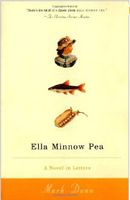 This is the book I spent the month telling everybody they should read. It’s a seemingly light-weight epistolary novel set on the fictitious independent island-nation of Nollop, off the coast off South Carolina. Nollop was named after Nevin Nollop, author of the immortal phrase containing all the letters of the alphabet, ‘The quick brown fox jumped over the lazy dog.’ In fact, a statue with Nollop’s name and said pangram stands in the town square, and when letters start falling off, the Town Fathers see it as “Nollop’s Will” and ban the use of those letters, both in oral & written communication. As each letter is dropped from used by the islanders, so it is by the author of the book.
This is the book I spent the month telling everybody they should read. It’s a seemingly light-weight epistolary novel set on the fictitious independent island-nation of Nollop, off the coast off South Carolina. Nollop was named after Nevin Nollop, author of the immortal phrase containing all the letters of the alphabet, ‘The quick brown fox jumped over the lazy dog.’ In fact, a statue with Nollop’s name and said pangram stands in the town square, and when letters start falling off, the Town Fathers see it as “Nollop’s Will” and ban the use of those letters, both in oral & written communication. As each letter is dropped from used by the islanders, so it is by the author of the book.
But this is more than just a clever lipogram (a written work composed of words selected as to avoid the use of one or more letters of the alphabet.) The effect of losing the use of the letters is startling, and the fabric of island life begins to unravel quickly. There is implied comment on religious extremism and on police states. It’s really very well-done.
What’s not to like? (Written) letters. Clever use (or non-use) of (alphabet) letters. Pick up this delightful little book and be prepared to ponder bigger issues than you think you will.
Thank you to Simon at Stuck in a Book who first brought this gem to my attention. 5 stars
Read this if: you love words.
* THE WARS by Timothy Findley (Fiction, WWI, Canadian author) 
When I saw The Wars was the April choice for the War & Literature Readalong, I wondered how I had never heard of this early novel by one of Canada’s literary leaders. Since I’ve read it, I wonder all the more.
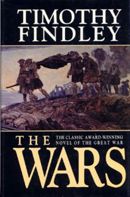 Set in WWI, the story tells of young officer Robert Ross who enlists after a family tragedy leaves him bereft. Written and published in the mid-1970s when it was still possible to talk to people who remembered that war, and the elderly veterans who marched in the Remembrance Day parade had fought in the French mud, it has an immediacy and power that many other First World War novels that I have read lack.
Set in WWI, the story tells of young officer Robert Ross who enlists after a family tragedy leaves him bereft. Written and published in the mid-1970s when it was still possible to talk to people who remembered that war, and the elderly veterans who marched in the Remembrance Day parade had fought in the French mud, it has an immediacy and power that many other First World War novels that I have read lack.
Findley’s prose is spare. There are no wasted words. It’s very powerful, and with no profanity. 5 stars
Read this if: you care about the animals—chiefly horses and mules—that were caught ’in service’ in the Great War.
THE FAULT IN OUR STARS by John Green (Fiction, YA) 
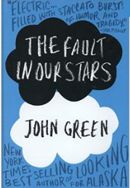 I’m sure I don’t have to tell you what this one is about. If you haven’t read it yet, you’ve read about it scores of times. I came to this book with a slightly cynical attitude but, although I didn’t cry, I did get teary-eyed a couple of times. It’s intelligently told and humanely felt. 4 stars
I’m sure I don’t have to tell you what this one is about. If you haven’t read it yet, you’ve read about it scores of times. I came to this book with a slightly cynical attitude but, although I didn’t cry, I did get teary-eyed a couple of times. It’s intelligently told and humanely felt. 4 stars
Read this if: you’d like some insight into how to relate to a young person with a serious illness; or you’re an adolescent thinking about life and death and their meaning.
* THE LAST RAIN by Edeet Ravel (Fiction, Historical, Canadian author)
by Edeet Ravel (Fiction, Historical, Canadian author) 
This novel is set on a kibbutz in Israel, mostly in the years 1949 and 1961.
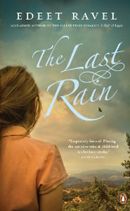 The story jumps to various points of view and time periods, as well as formats (bits of a play, excerpts of committee meeting minutes, diary entries, and so on) at what is, at first, a dizzying—and sometimes annoying—rate. But piecing it together is all part of the plot, illustrating the complexities of any experiment to create a utopia.
The story jumps to various points of view and time periods, as well as formats (bits of a play, excerpts of committee meeting minutes, diary entries, and so on) at what is, at first, a dizzying—and sometimes annoying—rate. But piecing it together is all part of the plot, illustrating the complexities of any experiment to create a utopia.
Perhaps the photos of the (fictional) characters were the author’s own, since she grew up on a kibbutz? They were an additional element to keep the reader off-balance throughout.
When I finished the book, I wanted to start at the beginning and read it again now that I had the whole picture. 4 stars
Read this if: you’d like some insight into how the modern country of Israel was settled after its formation in 1949; or you’ve ever wondered about life in a commune-type setting.
* ELIZABETH AND HER GERMAN GARDEN (Fiction, Classic) by Elizabeth von Armin 
I’ve been wanting to read von Arnim for some time and decided to start with this title, her 1898 debut, because it is the one that Crawley House’s Mr. Molesley gave to Anna Smith when he tried to court her during Mr. Bates’ first absence in early season 2 of Downton Abbey. 
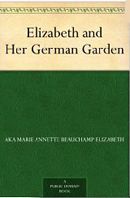
Von Arnim was a young English woman who married an older German Count, and Elizabeth and her German Garden is considered semi-autobiographical. In it, a young wife and mother flees her hated social life in the city to live at one of her husband’s country estates and tend the garden.
It’s sensual, witty, and sweet all at once. 4 stars
Read this if: you love gardens; or, like me, you just want the thrill of that Downton  connection!
connection!
* LESS THAN ANGELS (Fiction, Vintage, Humour) by Barbara Pym 
This 1955 novel is an incisive social satire that opens a window onto the insular world of London’s anthropologic community & its students.
Tongue firmly in check, Pym writes:
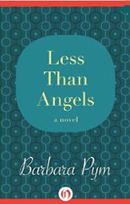 Felix had explained so clearly what it was that anthropologists did (. . .) They went out to remote places and studied the customs and languages of the peoples living there. Then they came back and wrote books and articles about what they had observed (. . .) It was as simple as that. And it was a very good thing that these languages and customs should be known, firstly because they were interesting in themselves and in danger of being forgotten, and secondly because it was helpful to missionaries and government officials to know as much as possible about the people they sought to evangelize or govern.
Felix had explained so clearly what it was that anthropologists did (. . .) They went out to remote places and studied the customs and languages of the peoples living there. Then they came back and wrote books and articles about what they had observed (. . .) It was as simple as that. And it was a very good thing that these languages and customs should be known, firstly because they were interesting in themselves and in danger of being forgotten, and secondly because it was helpful to missionaries and government officials to know as much as possible about the people they sought to evangelize or govern.
In addition to the observations of those returned from Africa, Pym observes the townies observing their suburbanite brothers, women observing men, students observing graduates . . . all the world’s a foreign culture to someone. 4 stars
Read this if: you want to try one of Pym’s gentle satires that doesn’t concern the Anglican (or any other) church.
*
*
* As mentioned, The Wars was the April pick for the War & Literature Readalong, hosted by Caroline at Beauty is a Sleeping Cat.
* I read The Last Rain as this month’s random pick from my TBR wish list spreadsheet of 2,456 items for the Random Reads Challenge hosted by I’m Loving Books. I first noticed a recommendation for it in MORE magazine. (Find it at MagazineDiscountCenter)
* Garden (Elizabeth’s German) is a qualifying word in the Keyword Reading Challenge at Bookmark to Blog.
* Less Than Angels is the fourth Barbara Pym that I’ve read, as I keep up with the LibrayThing Virago group read-along for Barbara Pym’s centenary.



BOOK DEPOSITORY has free world-wide delivery:


OR: Pick up some bargains at

OR

 Ammonite: (from the horn of Ammon – Jupiter – whose statues were represented with ram’s horns): Any of the flat, usually coiled fossil shells of an extinct order of mollusks.
Ammonite: (from the horn of Ammon – Jupiter – whose statues were represented with ram’s horns): Any of the flat, usually coiled fossil shells of an extinct order of mollusks. Pantile: A roofing tile having an S curve, laid with the large curve of one tile overlapping the small curve of the next
Pantile: A roofing tile having an S curve, laid with the large curve of one tile overlapping the small curve of the next




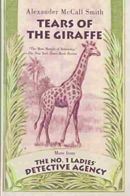 In Tears of the Giraffe Mma Ramotswe searches for the fate of a young American man who worked on a co-operative farm in the area a decade earlier. She is also surprised by her fiancé with the addition to their ‘family’ of two orphans.
In Tears of the Giraffe Mma Ramotswe searches for the fate of a young American man who worked on a co-operative farm in the area a decade earlier. She is also surprised by her fiancé with the addition to their ‘family’ of two orphans.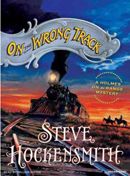 Since then, I’ve wanted to read more about this duo whose older half idolizes Sherlock Holmes and wants to model himself after him. It’s left to Otto to chronicle their adventures. In this instalment, they are hired by the Southern Pacific Railroad as detectives on a Utah to California trip, and run up against notorious train robbers.
Since then, I’ve wanted to read more about this duo whose older half idolizes Sherlock Holmes and wants to model himself after him. It’s left to Otto to chronicle their adventures. In this instalment, they are hired by the Southern Pacific Railroad as detectives on a Utah to California trip, and run up against notorious train robbers. 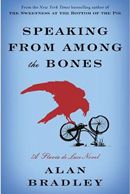 I’m a big fan of Flavia, a spunky 11-year-old with a passion for chemistry, who travels her world of Bishop’s Lacey on her trusty bike Gladys.
I’m a big fan of Flavia, a spunky 11-year-old with a passion for chemistry, who travels her world of Bishop’s Lacey on her trusty bike Gladys. 
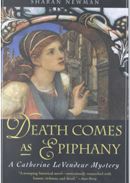 Set in 12th century France, this features Catherine, a young novice and scholar at the Convent of the Paraclete, who is sent by the Abbess Heloise on a perilous mission to find out who is trying to destroy the reputation of the convent and, through it, that of the abbess’s onetime lover and patron, theologian Peter Abelard.
Set in 12th century France, this features Catherine, a young novice and scholar at the Convent of the Paraclete, who is sent by the Abbess Heloise on a perilous mission to find out who is trying to destroy the reputation of the convent and, through it, that of the abbess’s onetime lover and patron, theologian Peter Abelard.

 This is the book I spent the month telling everybody they should read. It’s a seemingly light-weight epistolary novel set on the fictitious independent island-nation of Nollop, off the coast off South Carolina. Nollop was named after Nevin Nollop, author of the immortal phrase containing all the letters of the alphabet, ‘The quick brown fox jumped over the lazy dog.’ In fact, a statue with Nollop’s name and said pangram stands in the town square, and when letters start falling off, the Town Fathers see it as “Nollop’s Will” and ban the use of those letters, both in oral & written communication. As each letter is dropped from used by the islanders, so it is by the author of the book.
This is the book I spent the month telling everybody they should read. It’s a seemingly light-weight epistolary novel set on the fictitious independent island-nation of Nollop, off the coast off South Carolina. Nollop was named after Nevin Nollop, author of the immortal phrase containing all the letters of the alphabet, ‘The quick brown fox jumped over the lazy dog.’ In fact, a statue with Nollop’s name and said pangram stands in the town square, and when letters start falling off, the Town Fathers see it as “Nollop’s Will” and ban the use of those letters, both in oral & written communication. As each letter is dropped from used by the islanders, so it is by the author of the book. Set in WWI, the story tells of young officer Robert Ross who enlists after a family tragedy leaves him bereft. Written and published in the mid-1970s when it was still possible to talk to people who remembered that war, and the elderly veterans who marched in the Remembrance Day parade had fought in the French mud, it has an immediacy and power that many other First World War novels that I have read lack.
Set in WWI, the story tells of young officer Robert Ross who enlists after a family tragedy leaves him bereft. Written and published in the mid-1970s when it was still possible to talk to people who remembered that war, and the elderly veterans who marched in the Remembrance Day parade had fought in the French mud, it has an immediacy and power that many other First World War novels that I have read lack. I’m sure I don’t have to tell you what this one is about. If you haven’t read it yet, you’ve read about it scores of times. I came to this book with a slightly cynical attitude but, although I didn’t cry, I did get teary-eyed a couple of times. It’s intelligently told and humanely felt. 4 stars
I’m sure I don’t have to tell you what this one is about. If you haven’t read it yet, you’ve read about it scores of times. I came to this book with a slightly cynical attitude but, although I didn’t cry, I did get teary-eyed a couple of times. It’s intelligently told and humanely felt. 4 stars The story jumps to various points of view and time periods, as well as formats (bits of a play, excerpts of committee meeting minutes, diary entries, and so on) at what is, at first, a dizzying—and sometimes annoying—rate. But piecing it together is all part of the plot, illustrating the complexities of any experiment to create a utopia.
The story jumps to various points of view and time periods, as well as formats (bits of a play, excerpts of committee meeting minutes, diary entries, and so on) at what is, at first, a dizzying—and sometimes annoying—rate. But piecing it together is all part of the plot, illustrating the complexities of any experiment to create a utopia.
 Felix had explained so clearly what it was that anthropologists did (. . .) They went out to remote places and studied the customs and languages of the peoples living there. Then they came back and wrote books and articles about what they had observed (. . .) It was as simple as that. And it was a very good thing that these languages and customs should be known, firstly because they were interesting in themselves and in danger of being forgotten, and secondly because it was helpful to missionaries and government officials to know as much as possible about the people they sought to evangelize or govern.
Felix had explained so clearly what it was that anthropologists did (. . .) They went out to remote places and studied the customs and languages of the peoples living there. Then they came back and wrote books and articles about what they had observed (. . .) It was as simple as that. And it was a very good thing that these languages and customs should be known, firstly because they were interesting in themselves and in danger of being forgotten, and secondly because it was helpful to missionaries and government officials to know as much as possible about the people they sought to evangelize or govern.